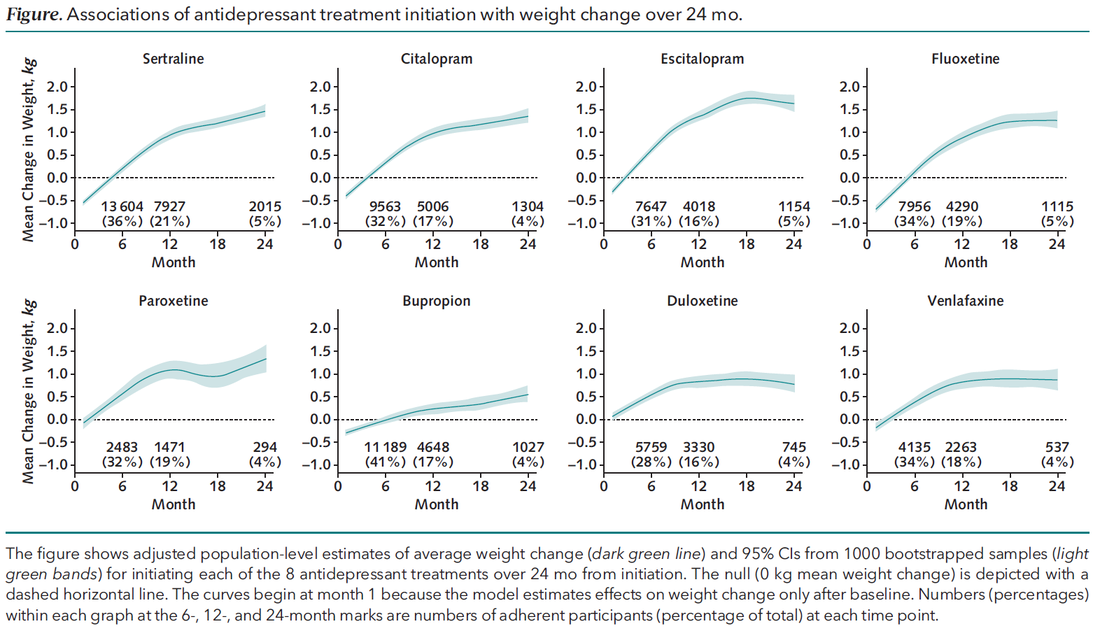 Joshua Petimar, ScD If you’ve ever taken prescription medication, you know side effects can be a major concern. When listening to any pharmaceutical ad, you’ll hear a long list of potential side effects, from mild symptoms like upset stomach to serious issues like increased risk of infections and cancer. Side effects can introduce new health problems and cause people to stop treatment for their initial health issue.  Side effects are a common concern for the 1 in 7 Americans taking an antidepressant. One worry patients have about taking antidepressants is potential weight gain. This is understandable as weight gain can translate into higher risk of chronic diseases like diabetes and heart disease. It’s also very difficult for most people to lose weight and keep it off. Some patients may be so concerned about weight gain that they stop taking their medication altogether, increasing the risk of depression relapse and hospitalization. Given that antidepressants remain crucial to improving the health and well-being of those living with psychiatric disorders, research into understanding potential side effects is crucial. For example, wouldn’t it be great if patients and their doctors could predict which antidepressants would lead to the most or least weight gain before they start treatment? Our new study, published in Annals of Internal Medicine, sought to answer this exact question. We compared average weight change among 180,000 patients in the U.S. who were prescribed one of 8 common first-line antidepressants for the first time (sertraline, citalopram, escitalopram, fluoxetine, paroxetine, duloxetine, venlafaxine, and bupropion). We followed the patients for 2 years and compared weight change at 6, 12, and 24 months. We found that all medications were associated with weight gain after 6 months, except bupropion. Patients gained about 0.3-0.4 kg more weight (about 0.7-0.9 lb.) if they took escitalopram, paroxetine, or duloxetine compared to sertraline (the most commonly prescribed medication). However, many of these differences narrowed when we looked at weight change after 12 and 24 months. In contrast, patients gained about 0.2 kg less weight (about 0.4 lb.) after 6 months if they took bupropion rather than sertraline. At 12 months, they were expected to gain 0.7 kg less weight (about 1.5 lb.), and at 24 months, they were expected to gain 0.9 kg less weight (about 2 lbs.). These results led us to conclude that bupropion was associated with the least amount of weight gain among the 8 antidepressants we examined. Of course, bupropion might not be right for all patients. For doctors who prefer SSRIs (the most common subclass of antidepressants) and are concerned about their patients’ weight, they might consider sertraline or fluoxetine. Of the SSRIs we studied, these were associated with the least amount of weight gain in the first 6 months—when patients might be more likely to stop taking their medication due to side effects. Of course, weight gain is just one component of antidepressant treatment. Doctors must balance a drug’s potential to treat a specific patient’s health issues with other side effects that could impact their life. For antidepressants, other common side effects include upset stomach, diarrhea, headache, and sexual dysfunction. Some of these might be more concerning to patients than weight gain. Patients and doctors need to have a conversation about which medication is right for their health and well-being before beginning a new treatment. Hopefully, our study will help doctors better communicate the risks of weight gain to their patients and enable them to make more informed decisions about their treatment.
0 Comments
Your comment will be posted after it is approved.
Leave a Reply. |
©2017 WeighingInBlog. All rights reserved. 401 Park Drive, Boston, MA




 RSS Feed
RSS Feed

